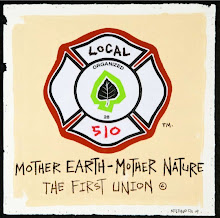
"What's startling to me is that when I started talking about ideas like these 30 years ago, they were so new and strange that people looked at me as if I had two heads. In retrospect, I think I was looked on as something of a cultural clown - a "crazy" who was fun to listen to. The reaction I get now worries me a lot more, because what most people say is "Bob, today you're right, but we're not going to do anything about it."'
"My goal is to create a situation of full unemployment--a world in which people do not have to hold a job. And I believe that this kind of world can actually be achieved." _Robert Theobald
It is time for action in the streets, concerning full employment in America!
From his book, Rapids of Change, I quote the author, economist and futurist_ whose time is now:
Avoiding Catastrophic Failures (p.178-181)
The long-run cycles in Western industrial systems have played a critical part in ensuring the continued viability of rich societies. They have purged the excesses which accumulated as oversupply built up. Obsolete goods and facotires were consigned to the dustheap. Of course, this unemotional description of a slump hides the agony of people who (were)(my parenthesis) made useless. It also enables us to foget the wars that have been fought for markets./ Nevertheless, the mechanisms did work, despite the pain caused.
Today, however, we must learn how to prevent slumps and other massive catastrophes because the potential consequences are too dangerous. To do this we must gain a better understanding of what goes on during the development of the long-run cycle.
Economies emerge from a slump in a state of relative balance. People have been sufficiently firghtened by the disasters they have experienced that they choose to be careful. But as the years go by, excitement grows and the magnitude of the short-run cycles begins to increase.
Constraints, both regulatory and within professions, are imposed. But the general trend remains upward, and over excitement begins to take hold. Governments try to control these excesses. But the trends still look good to people. At this point, systems move onto a very dangerous downward slope through feverishness controlled by ever increasing power and then chaos.
At the end of the Carter Administration, we were firmly set on a course through fever into chaos because of excessive demand and inflation. The Reagan administration controlled inflation, but was also willing to allow other imbalances by pushing hige amounts of credit into the system, and by allowing business funding though junk bonds. Other countries have followed similar policies.
Can we move back up the circle and reverse the normal direction of flow toward entropy and breakdown? this question arises not only for economic slumps but also in human breakdowns. We can learn how we might act economically if we look at personal patterns. We used to assume that alcoholics and drug users had to fall, literally and figuratively, into the gutter before they would be willing to save themselves. It was thought that they would not be willing to make the effort to escape their cravings uintil there was absolutely no other option. We have now discovered ways to surround the alcoholic with fammily, friends and colleagues and to challenge her or him into accepting the need for change. this is a tough role because the alcoholic has perfected avoidance mechanisms and escape hatches just to avoid facing the ultimate consequences of his or her path. But an individual can be effectively confronted and the approaches to make the challenge as successful as possible have been developed over time.
Similarly, we have learned better skills for preventing catastrophic breakup in marriages if people wish to avoid anger and hatred. Families can be counseled in ways which help them decide whether they can effectively get back together or need to break up. If breaking up is necessary this cvan also be handled positively, although the need for leagal processes all too often detroys this possibility. Similar processes have been developed for larger groups including institutional renewal. I was able to healp a community college in Dallas rediscover the excitement of teaching and the joy of education. We do know the patterns and understandings which are required for both personal and institutional renewal.
We need to develop large-scale social processes similar to those which have been learned for individuals, families, and groups. We can confront people with the need for change in ways they cannot easiliy avoid. Personal change is achieved by forcing people to listen to what they don't want to hear. It might seem then that all we have to do is send more and more messages about growing evidence of potential catastrophe. This will not work, however, because most people have become experts at tuyning out messages they don't want to hear.
Unpleasant messages are all to easily blocked unless the messenger is trusted. The alcoholic eventually listens because the costs of ignoring the challenges of family, friends and colleagues is too high to be tolerable. We must develop a trust relationship with those we want ro influence in the society if we hope to get them to listen and then commit to avoiding total breakdown.
People are so stressed out today that the first step toward trust is to give them a chance to unwind. This is a fundamentally different strategy from that usually chosen by the change agents. Rapids is one step toward this new approach. It starts from the assumption that we can challenge people to move toward an attitude of realistic hope. Most people no longer believe that there is a shortcut to a better world, but many are still willing to try to build new approaches with each other.
The core aspect of our work will be to pull individuals, groups and systems away from the chaos into which we are drifting and back toward balance. Fortunately, a great deal of imaginative work has already been done in this area. We have the tools and models that can be employed, once we fully understand our directions and why they are fundamentally different from those of industrial systems."
To be continued... Ask yourself how much of this reading is a review? Where are we now? How is any of this information different? Should "industrial systems" be replaced with "corporate institutional/environments"?
*Thank-you for this uplifting inspiration from Diane Wilson!!
Friday, July 23, 2010
Social Entrepreneurship in Turbulent Times
Posted by
la fin du siècle
at
1:36 PM
![]()
Labels: economic recovery, employment for everyone, rapids of change, robert theobald
Subscribe to:
Post Comments (Atom)





























No comments:
Post a Comment